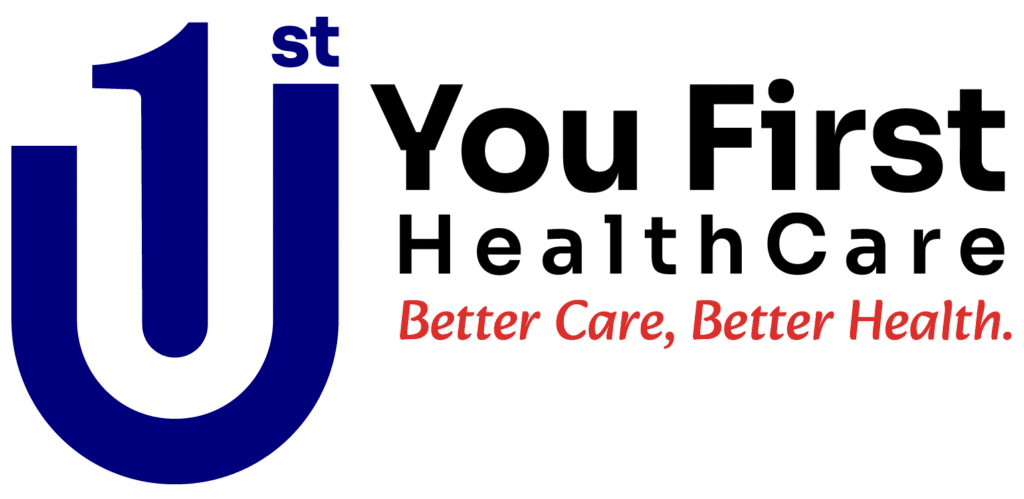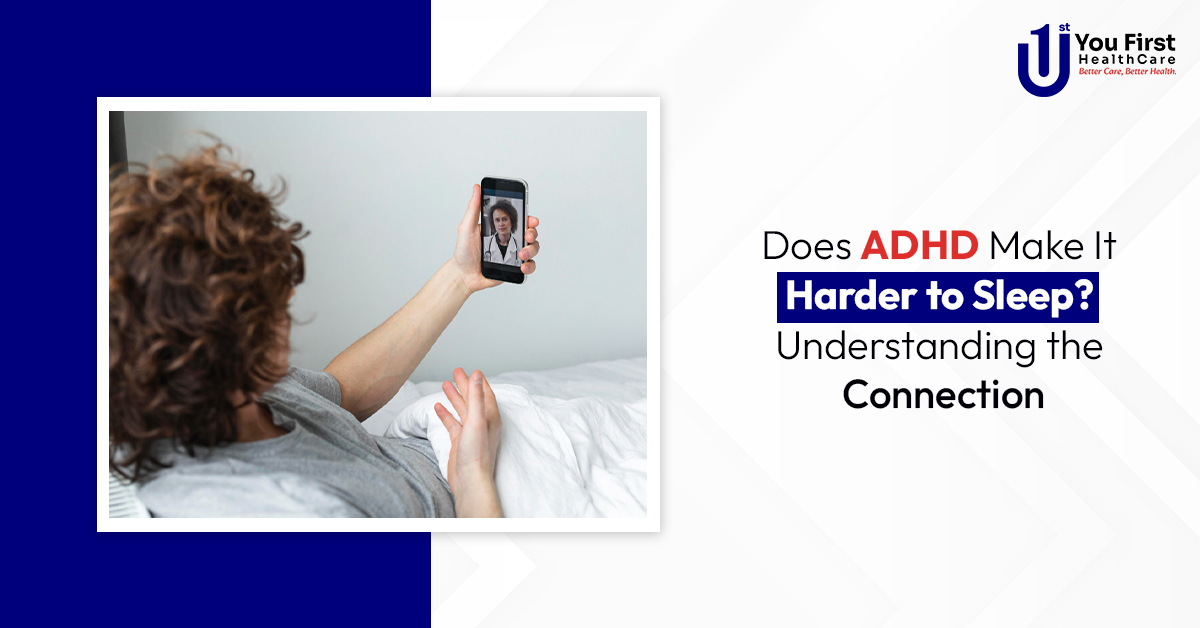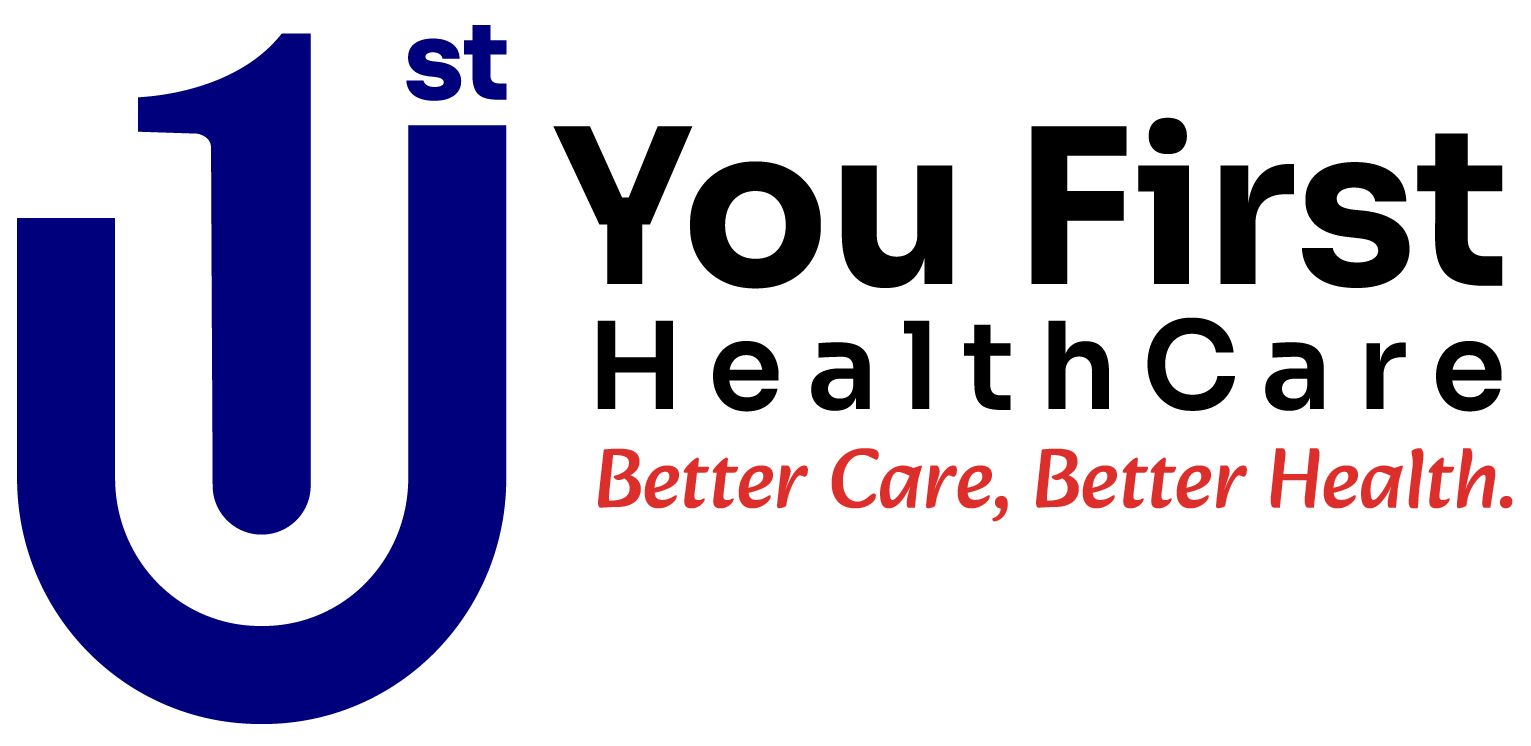Sleep is one of the most essential parts of health. When we sleep well, the body heals, the brain rests, and the next day feels easier.
But for many people who live with ADHD, getting a good night’s rest is not simple. Falling asleep can take hours, staying asleep can be difficult, and waking up rested may feel impossible.
But why does this happen? Why does ADHD make it harder to sleep?
Let’s examine the connection between ADHD and sleep, and what can help.
What Is ADHD?
ADHD means Attention-Deficit/Hyperactivity Disorder. It changes how the brain functions. ADHD can make people unable to sit still, focus on something, or have rapid thoughts. Some will be very active, while others will be more distracted.
At You First Healthcare, we care for many patients with ADHD who say sleep is one of their biggest challenges. Even when they try hard, their brains do not want to rest.
Why Sleep Matters for Everyone
Sleep is vital for our mental health and the clarity of our brain function. Without it, thinking is hard, and emotions overwhelm.
Sleeping well eases life. It calms our minds and strengthens our bodies. In those affected by ADHD, it provides the energy that they use to confront their day.
Focus may be impaired when we do not have sufficient sleep. We will have increased mood swings, strain, and worry. It also impacts how we perform in school, at job sites, and in relationships.
At You First Healthcare, we see how insufficient sleep worsens ADHD symptoms. When ADHD worsens, sleep often suffers. This can create a never-ending cycle.
How ADHD Affects Sleep
People with ADHD often notice patterns in their sleep. Some cannot fall asleep because their minds are too busy. Some wake up many times at night and toss and turn. Others sleep but wake up tired, as if they do not rest.
At You First Healthcare, many patients share that their sleep feels “all over the place.” One night they sleep fine, but the next night they can’t. This makes it hard to keep a routine. A routine is essential, especially for ADHD.
Why Does ADHD Make It Harder to Sleep?
ADHD can make sleep difficult for several reasons. One is brain chemistry. People with ADHD often have differences in dopamine and other chemicals. These imbalances can disrupt sleep.
Another reason is an overactive mind. Many patients report that their imaginations increase in volume when the lights go dark. They replay conversations, worry about tomorrow, or jump from idea to idea. This racing mind can keep them awake for hours.
There is also something called delayed sleep phase. This means the body clock of many people with ADHD is set later. They feel awake at night but very tired in the morning. We see this in both children and adults at You First Healthcare.
Anxiety and depression, which usually come with ADHD, also impact sleep. Some ADHD medications can also make it harder to rest, especially if taken later in the day.
At You First Healthcare, our providers review medications with each patient. We aim to ensure that treatment supports focus during the day and healthy sleep at night.
ADHD and Sleep in Kids and Adults
Sleep can be hard for kids and adults with ADHD. Children are not usually willing to go to bed. They can demand snacks, chat, or move up and down. They may toss, turn, or wake up too early, even sleeping. This can make mornings tough and lead to more tantrums and trouble listening.
Adults face sleep problems, too. Many feel most awake at night. They can begin new projects, watch television, or spend hours with their phones. This keeps them from getting good rest, and the next day, they feel harder at work, with family, or with emotions.
At You First Healthcare, we guide families to notice these patterns and shift their habits toward better rest.
The Cycle of ADHD and Sleep
ADHD and sleep problems create a cycle that can feel endless. ADHD makes it harder to sleep. Poor sleep makes ADHD symptoms stronger. Stronger symptoms make the next night even harder.
At You First Healthcare, we focus on breaking this cycle. We provide mental health support, medication management, and lifestyle guidance.
What Can Help Improve Sleep with ADHD
Small steps can help people with ADHD sleep better. Establish a sleep schedule to calm your mind. Turn off screens beforehand. Create a dark and quiet sleeping environment.
Burn off energy by exercising during the day. Before sleeping, use deep breathing, stretching, or relaxing music. Speak with your provider regarding when or the quantity, just in case you take ADHD medication.
At You First Healthcare, we help patients with these steps and review medications to avoid sleeplessness.
When to Ask for Help
Sleep problems can last too long and affect daily life. If someone feels tired every day, if ADHD symptoms grow stronger, or if stress and sadness rise, it may be time to ask for help.
At You First Healthcare, we remind patients that asking for support is not a weakness. It is a step toward feeling better and getting healthier sleep.
Final Thoughts
ADHD and sleep are connected. People with ADHD often struggle with sleep. It’s as if ADHD and poor sleep are trapped in a cycle that’s hard to escape.
With the proper support, sleep improves. A calm mind and steady routines lead to better mornings.
At You First Healthcare, your health is our top priority. Our team helps you achieve better sleep, feel better, and live better. Reach out for ADHD sleep support.
If ADHD makes sleep challenging, reach out to You First Healthcare today.
FAQs
Can ADHD medication affect sleep?
Yes, it can. Some medicines make it harder to fall asleep if taken too late in the day. At You First Healthcare, providers work with patients to find the best timing and plan so that medicine helps during the day but does not harm sleep.
When should I see a doctor about ADHD and sleep?
If poor sleep persists, causing stress, sadness, or worse, ADHD, get help. You First Healthcare is here to listen and support patients of all ages.



